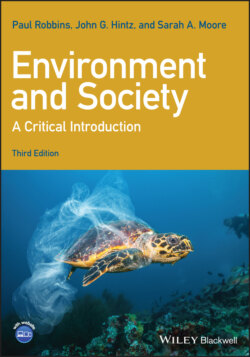Читать книгу Environment and Society - Paul Robbins - Страница 82
Are All Commoners Equal? Does Scale Matter?
ОглавлениеAs attractive and effective as an institutional perspective appears to be, it is not without detractors. At their core, these criticisms revolve around some of the assumptions that common property theory inherits from game theory. Specifically, these theories, as embodied in the Prisoner’s Dilemma and the “Tragedy of the Commons,” assume individual free agents of relatively similar power in both determining the outcome of the game and making choices to cooperate. In a world of complex political power and inequality, such assumptions are unrealistic and potentially dangerous.
Consider the ways that access to resources and the rules that govern them have been heavily influenced by social and political conditions surrounding, for example, gender. In many places ownership or inheritance of property is traditionally patriarchal and patrilineal, meaning women cannot own, or at least not inherit, property. At the same time, women’s labor may be essential for the maintenance or use of commons, including the drawing of water, the management of irrigation infrastructure, the tending of community gardens or forests, among many others. What this means for common property management is important, since matching rules with users and developing systems of collective choice becomes extremely difficult in places where not all users have equal access or responsibilities.
For these reasons, developing common property management regimes in village India, for example, can be difficult. Here, traditional decision-making bodies (called panchayats) tend to be dominated by men, and usually men from elite families or castes. If these decision-making bodies are the ones that make the rules about access to village pastures for grazing, they may be viewed as totally illegitimate by the people who use the resource, including women and more marginal groups who tend cattle. If, on the other hand, new collective decision groups are formed to make new rules, and these groups include women and more marginal groups, they might still be dominated by historically powerful communities, again leading to a lack of legitimacy. In either case, a weak authority may lead to indiscriminate use of the grazing lands by people who feel excluded or, worse, view the establishment of rules as effectively representing a taking-away of their traditional rights. Forming clear common property systems may be desirable in complex power-laden contexts, but it may not be easy by any means (Figure 4.3).
Figure 4.3 A woman tending her herd in India. In many parts of the world the responsibility for using common property and the control over the rules of the commons are often split along lines of gender, class, or race, portending problems for management.
This insight (from the field of feminist political economy: see Chapter 12) can be extended to all commons, whether users are differentially empowered because of income, race, or a host of other discriminatory factors. Under such conditions, the dynamics of the commons become dramatically more complex and sometimes untenable. Social difference and social power make collective decision-making far more difficult, since parties may not trust one another and because the self-imposed group rules determined from common property management may suit the interests of only a small proportion of commons users. Bear in mind that the first and foremost rule of common property resource management is the bounding and exclusion of some potential user populations (Ostrom 2002). Where such exclusions are founded on basic inequalities, many people will be less inclined to cooperate and failure becomes inevitable. So while “getting the rules right” is the favored approach for an institutional solution to environmental crises, some problems, especially problems of power, come far prior.
A final problem of institutional analysis emerges from disagreement over the degree to which the lessons of the countless local common property regimes around the world can easily transfer to larger problems, spread over more diverse populations, at scales beyond the daily experience of people. Some have argued that collective action can only occur in small groups, where face-to-face interaction builds trust, as in an irrigator community. Other evidence suggests, however, that distant people can come together in cooperative regimes, because they are united by the common property they share, as in the case of the atmosphere and climate system.
Can we “scale up” from the local commons to the global commons? It is possible that the future of the planet rests on the resolution of this very question.
